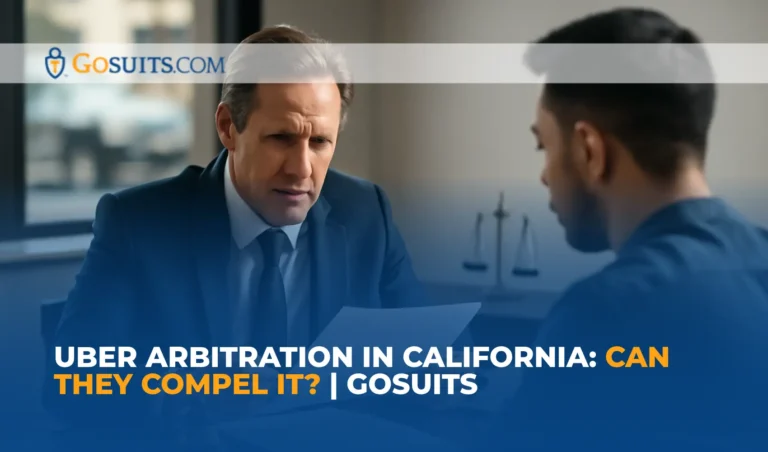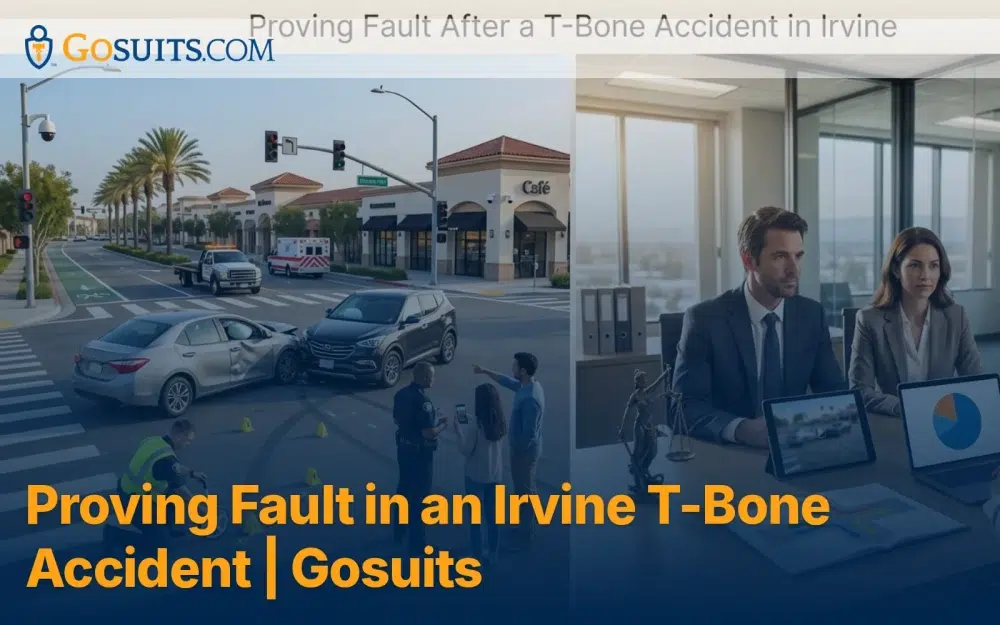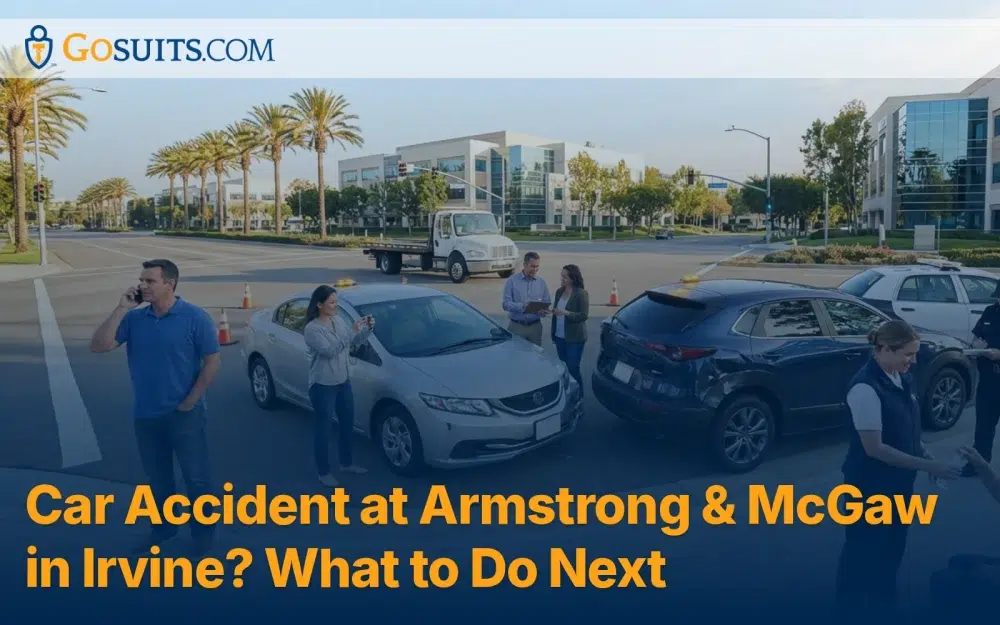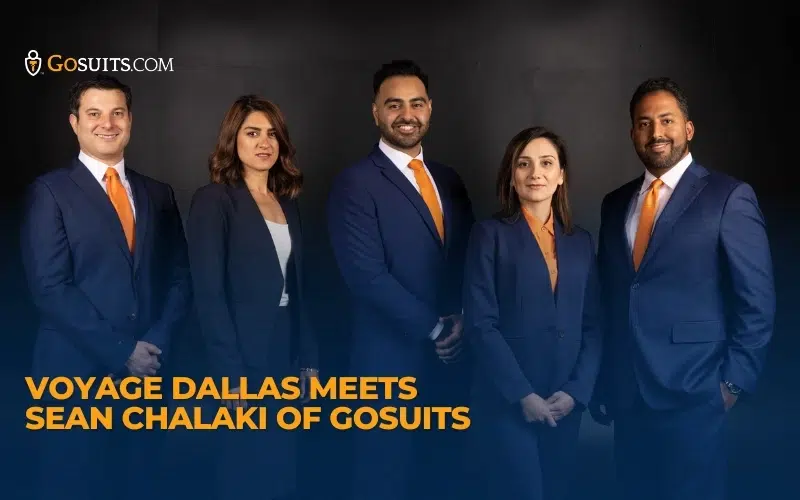- What does Uber arbitration mean in California personal injury cases?
- When can Uber move to compel arbitration in California?
- Can Uber force arbitration in a third-party claim if you never agreed?
- What if you were an Uber passenger who clicked “I agree”?
- How can you oppose a motion to compel arbitration in California?
- What does Uber insurance cover, and does insurance affect arbitration?
- How do federal preemption and recent Supreme Court cases affect your options?
- What practical steps should plaintiffs and defendants take now?
- Where have California courts landed in Uber-related arbitration cases?
- FAQs for California Uber crash cases about arbitration
- How GoSuits approaches Uber arbitration battles in California
- Authoritative resources and citations
What does Uber arbitration mean in California personal injury cases?
Arbitration is a private dispute resolution process where an arbitrator, not a judge, decides your case. Companies like Uber often include arbitration clauses in their user agreements and driver contracts. In California civil injury cases, the big question is whether Uber can use those clauses to take your lawsuit out of a Los Angeles, San Diego, San Jose, San Francisco, Sacramento, Orange County, Riverside, San Bernardino, Oakland, or Fresno courtroom and into a private arbitration forum.
Under the Federal Arbitration Act, agreements to arbitrate are generally valid and enforceable, similar to other contracts, unless standard contract defenses apply, such as fraud, duress, or unconscionability (9 U.S.C. § 2) (Cornell Law). California courts apply both federal and state arbitration law, but federal law preempts any state rules that single out arbitration for worse treatment.
Practically, Uber may file a motion to compel arbitration soon after you sue. Whether that motion succeeds depends on facts like whether you signed up as a rider and agreed to the app’s terms, whether your claims fall within the clause, whether a “delegation clause” sends gateway disputes to the arbitrator, and whether exceptions for non-signatories apply when you never agreed at all.
Traffic crashes are a serious public safety issue statewide. California reported 4,407 traffic fatalities in 2022, a 2.6 percent decrease from 2021, but still a staggering toll on families and communities (California Office of Traffic Safety). In that context, arbitration battles matter because they can change the pace, process, and transparency of serious injury and wrongful death claims involving rideshare vehicles.
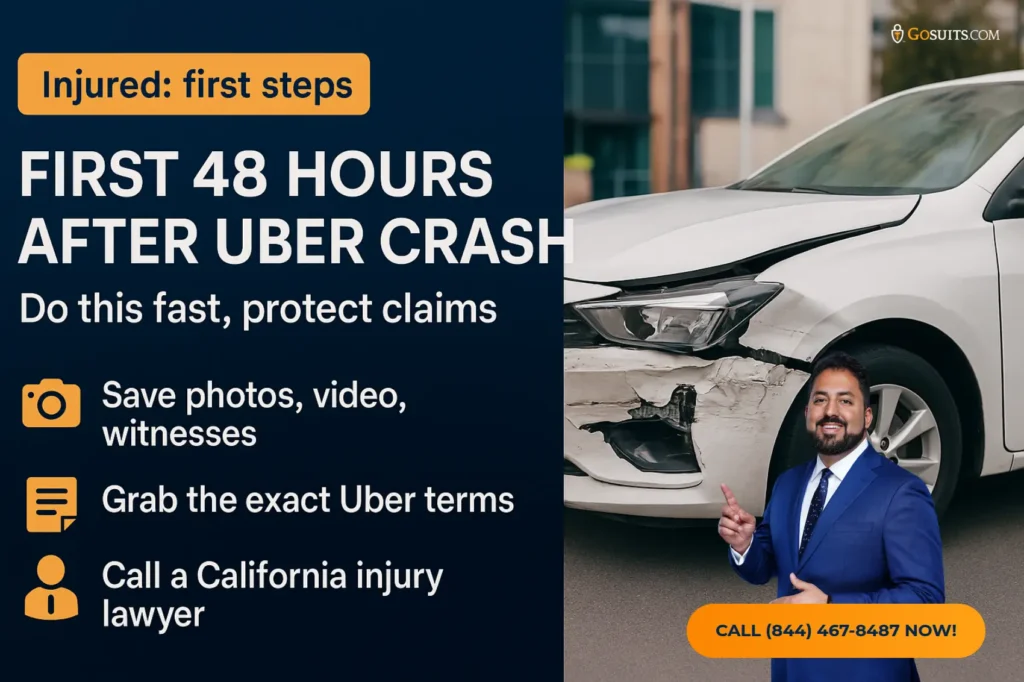
When can Uber move to compel arbitration in California?
What law governs a motion to compel arbitration in California?
Two bodies of law typically govern:
- Federal Arbitration Act. Sections 2 through 4 of the FAA make written arbitration agreements enforceable and allow courts to compel arbitration if there is a valid agreement and a refusal to arbitrate (9 U.S.C. § 2).
- California Arbitration Act. California Code of Civil Procedure section 1281.2 authorizes courts to order arbitration if an agreement exists and a party refuses to comply, subject to specific statutory exceptions. Section 1281.4 provides for a stay of litigation if arbitration is ordered (CCP § 1281.2; CCP § 1281.4).
Courts apply the FAA when the transaction involves interstate commerce, which rideshare platforms generally do. If the FAA applies, it can preempt state rules that disfavor arbitration, but traditional contract defenses remain available.
Who decides if an arbitration agreement exists and applies to your case?
Courts decide these “gateway” questions unless the contract clearly and unmistakably delegates arbitrability to the arbitrator. The U.S. Supreme Court held that when parties have a valid delegation clause, courts must send arbitrability disputes to the arbitrator, even if the argument for arbitration seems weak (Henry Schein, Inc. v. Archer and White Sales, Inc., 139 S. Ct. 524 (2019); Rent-A-Center, West, Inc. v. Jackson, 561 U.S. 63 (2010)). To avoid delegation, you must specifically challenge the delegation clause itself, not just the arbitration provision overall.
How do California courts decide a motion to compel arbitration?
- Burden of proof. The party moving to compel must prove the existence of a valid arbitration agreement. If they do, the burden shifts to the opposing party to show a defense such as unconscionability, revocation, waiver, or that the clause does not cover the claims (Rosenthal v. Great Western Fin. Securities Corp., 14 Cal. 4th 394 (1996)).
- Evidence. Courts consider declarations, app screenshots, transactional records, and versions of the terms. In app cases, design, notice, and assent flow are crucial.
- Waiver. Even a valid arbitration right can be waived by litigation conduct inconsistent with arbitration, and a showing of prejudice is not required under federal law (Morgan v. Sundance, Inc., 596 U.S. 411 (2022)).
Can Uber force arbitration in a third-party claim if you never agreed?
What is equitable estoppel and when does it bind non-signatories?
Non-signatories are generally not required to arbitrate. But under state-law doctrines that the FAA recognizes, a non-signatory can sometimes be compelled where fairness requires it (Arthur Andersen LLP v. Carlisle, 556 U.S. 624 (2009)). California’s equitable estoppel doctrine can bind a non-signatory only if the plaintiff’s claims are intimately founded in and intertwined with the underlying contract containing the arbitration clause, such that the plaintiff seeks to exploit the contract while avoiding arbitration (Goldman v. KPMG LLP, 173 Cal. App. 4th 209 (2009)).
Federal courts applying California law have been cautious about equitable estoppel. If your claims arise from statutory duties or tort law, and do not depend on interpreting the contract, courts often refuse to bind you to someone else’s arbitration clause (Kramer v. Toyota Motor Corp., 705 F.3d 1122 (9th Cir. 2013)).
Can Uber use a driver’s arbitration agreement against an injured third party?
Usually no. If you are another motorist, pedestrian, or cyclist hit by an Uber vehicle in California, you did not agree to Uber’s or the driver’s arbitration clause. Uber may argue agency or third-party beneficiary theories. Courts typically reject compelling a stranger to arbitrate unless your claim relies on the contract’s terms. Standard negligence or wrongful death claims generally arise from duties imposed by law, not from the Uber-driver contract, so equitable estoppel does not fit under Goldman and Kramer.
Bottom line for third-party Uber claims in California: if you never used the app or accepted the terms, Uber faces a steep climb to compel arbitration.
Do wrongful death heirs have to arbitrate?
Wrongful death in California creates an independent claim for eligible heirs, not a derivative claim through the decedent, under Code of Civil Procedure section 377.60 (CCP § 377.60). Unless a specific statute applies, heirs who never agreed to arbitrate are typically not bound by a decedent’s arbitration clause. Courts have repeatedly recognized the independence of wrongful death claims in assessing whether non-signatory heirs can be compelled to arbitrate. Survival claims by the estate, by contrast, stand in the decedent’s shoes under section 377.30 (CCP § 377.30), so the decedent’s agreement can carry more weight for those claims.
What if you were an Uber passenger who clicked “I agree”?
Are Uber’s sign-up screens enough to form a contract?
Courts look at whether the app placed you on reasonable notice of the terms and whether you took action that signaled assent. In consumer app cases, courts enforce arbitration when the design clearly alerts users to the terms and requires an affirmative step, like tapping “Register” with language that proceeding means you accept the terms (Meyer v. Uber Techs., Inc., 868 F.3d 66 (2d Cir. 2017)). The Ninth Circuit has endorsed similar “sign-in wrap” arrangements when notice is reasonably conspicuous and assent is unambiguous (Oberstein v. Live Nation Entm’t, Inc., 60 F.4th 505 (9th Cir. 2023)).
For drivers, the Ninth Circuit enforced Uber’s 2014 arbitration agreement and its delegation clause, emphasizing riders or drivers could opt out and the clause clearly incorporated arbitrability rules (Mohamed v. Uber Techs., Inc., 848 F.3d 1201 (9th Cir. 2016)).
Can you challenge Uber’s arbitration clause as unconscionable?
Yes. California’s unconscionability doctrine requires both procedural unconscionability and substantive unconscionability, on a sliding scale. Procedural looks at oppression or surprise in the bargaining process. Substantive looks at whether terms are overly harsh or one-sided (Armendariz v. Foundation Health Psychcare, 24 Cal. 4th 83 (2000); OTO, L.L.C. v. Kho, 8 Cal. 5th 111 (2019)).
Common unconscionability arguments in rideshare cases include:
- Unclear or hidden terms during sign-up, weak disclosure, or confusing flows.
- Excessive cost-splitting or fee provisions that make it impractical to bring claims.
- One-sided carve-outs that let Uber go to court but force riders to arbitrate.
- Retroactive or unilateral modification terms that create surprise or lack of mutuality.
That said, the U.S. Supreme Court has held that rules targeting arbitration uniquely are preempted. Challenges must be grounded in general contract principles, not hostility to arbitration (AT&T Mobility LLC v. Concepcion, 563 U.S. 333 (2011)).
What about delegation clauses in Uber’s terms?
Many Uber agreements incorporate a delegation clause, often by incorporating arbitral rules that give arbitrators power to rule on their own jurisdiction. When that clause is clear and unmistakable, courts must send disputes about the scope or validity of the arbitration clause to the arbitrator, unless you specifically challenge the delegation clause as unconscionable (Rent-A-Center; Henry Schein; Mohamed).
How can you oppose a motion to compel arbitration in California?
What defenses can defeat arbitration?
- No agreement. You never saw or accepted the terms, or you were a third party with no contract at all. This matters for non-user claimants across California, including Los Angeles, San Diego, and the Bay Area.
- Scope. Your claims fall outside the arbitration clause’s language or carve-outs.
- Unconscionability. The clause is procedurally and substantively unconscionable under Armendariz and OTO.
- Invalid delegation. The delegation clause itself is unconscionable or not clear and unmistakable.
- Waiver. Uber or a co-defendant substantially litigated before moving to compel (Morgan v. Sundance).
- Non-signatory doctrines do not apply. Equitable estoppel, agency, or third-party beneficiary theories fail under California law when your tort claims are not based on the contract (Goldman; Kramer).
What evidence helps you win the threshold dispute?
- Sign-up records. Demand Uber’s backend logs for the exact screens, timestamps, IP addresses, device IDs, and the version of terms you purportedly accepted.
- User interface captures. Screenshots and archived designs showing whether the terms were conspicuous and linked.
- Declarations. Your declaration explaining the absence of notice or assent, especially if someone else used your phone or account.
- Arbitration cost terms. Fee schedules or provisions that create practical barriers to pursuing claims.
- Correspondence. Evidence of delay or inconsistent conduct that supports waiver.
What if Uber or the arbitration provider delays paying fees?
California law penalizes drafting parties that do not pay arbitration fees on time. If the drafting party fails to pay required fees within 30 days of the due date, it is in material breach of the arbitration agreement, and the consumer can withdraw from arbitration and proceed in court, among other remedies (CCP § 1281.97; CCP § 1281.98; CCP § 1281.99). This SB 707 framework is a practical tool if arbitration is initiated but stalls due to nonpayment.
What does Uber insurance cover, and does insurance affect arbitration?
How much coverage applies in California?
California law requires Transportation Network Companies to maintain specific insurance limits that vary by “periods” of the trip process.
- App on but no ride accepted. Primary liability coverage of at least $50,000 for death and bodily injury per person, $100,000 per occurrence, and $30,000 for property damage, plus excess coverage during this period (Cal. Pub. Util. Code § 5433).
- From ride acceptance to completion. At least $1,000,000 for death, personal injury, and property damage per incident. Additional coverages often apply depending on the platform’s policy (§ 5433; California Public Utilities Commission: TNCs).
These statutory minimums are designed to protect the public statewide, including large urban areas like Los Angeles and San Francisco and inland counties like Riverside and San Bernardino.

Does filing an insurance claim waive your right to litigate?
No. Presenting a bodily injury claim to Uber’s insurer does not, by itself, surrender your right to file suit or oppose arbitration. Insurers sometimes reference arbitration in policy endorsements, but those provisions usually govern disputes between insurer and insured, not a third-party claimant. The arbitration you are most likely to face is the platform’s user agreement, not the insurance policy.
How do federal preemption and recent Supreme Court cases affect your options?
Several decisions shape today’s arbitration landscape:
- Concepcion. States cannot apply rules that target arbitration agreements for disfavored treatment, such as blanket bans on class-action waivers (563 U.S. 333).
- Rent-A-Center and Henry Schein. Clear delegation clauses send arbitrability disputes to the arbitrator, unless you specifically challenge the delegation clause’s validity (Rent-A-Center; Henry Schein).
- Morgan v. Sundance. A party can waive arbitration through litigation conduct without the need to show prejudice, strengthening waiver arguments in California courts (596 U.S. 411).
- Arthur Andersen v. Carlisle. Non-signatory enforcement turns on state contract law, not a federal rule, which means California’s equitable estoppel standards control whether third parties can be compelled (556 U.S. 624).
Together, these cases make it critical to focus your opposition on standard contract defenses, the absence of assent, limits of California’s non-signatory doctrines, and case-specific facts like waiver or fee nonpayment.
What practical steps should plaintiffs and defendants take now?
What should injured people and families do first?
- Preserve evidence early. Capture app screenshots, notifications, and emails from Uber. Save photos, dashcam, and witness information from the crash scene anywhere in California.
- Get the terms. Request the exact terms of service and privacy policy in effect when you created your Uber account or used the ride.
- Assess signatory status. If you never used Uber at all, highlight your non-signatory status. If you used the app, evaluate notice and assent.
- Evaluate wrongful death pathways. Heirs and the estate may have different arbitration exposure under CCP sections 377.60 and 377.30. Treat them separately.
- Consider fee dynamics. If arbitration is underway, track invoice dates. SB 707’s fee deadlines may allow you to return to court if the drafting party pays late (CCP § 1281.97).
- Do not go it alone. Opposing a motion to compel often turns on nuanced case law, evidence, and deadlines. A California personal injury law firm can help you gather proof and build legal arguments.
What should defendants and insurers do to avoid waiver and disputes?
- Move early. Consider arbitration at the outset to avoid waiver under Morgan v. Sundance.
- Authenticate assent. Maintain detailed records of user flows, terms versions, and acceptance logs to meet your initial burden.
- Pay fees promptly. Track arbitration fee invoices to comply with CCP § 1281.97 timelines.
- Tailor non-signatory arguments. Apply California’s equitable estoppel criteria carefully. Overreaching can backfire.
- Address delegation. If relying on a delegation clause, be prepared to show clear and unmistakable evidence and rebut specific unconscionability challenges.
Where have California courts landed in Uber-related arbitration cases?
What do key cases say about Uber’s arbitration and delegation clauses?
- Mohamed v. Uber Techs., Inc., 848 F.3d 1201 (9th Cir. 2016). The court enforced Uber’s 2014 arbitration agreement with drivers, including a delegation clause, noting opt-out rights and clarity of terms, and rejected unconscionability arguments in that iteration (Google Scholar).
- Meyer v. Uber Techs., Inc., 868 F.3d 66 (2d Cir. 2017). The court enforced rider arbitration based on a sign-in screen that provided reasonably conspicuous notice, supporting enforcement of app-based agreements when design is clear (Google Scholar).
- Oberstein v. Live Nation, 60 F.4th 505 (9th Cir. 2023). Although not about Uber, the case is influential for app design principles. It upheld a sign-in wrap where users had reasonable notice and took an affirmative step to proceed (Google Scholar).
California appellate and federal district courts distinguish between signatories and non-signatories. Riders and drivers who agreed to terms often face arbitration, sometimes with a threshold delegation to the arbitrator. In contrast, third-party claimants who never used the app are rarely compelled, because their negligence or wrongful death theories arise independently of contract duties under California law.
How does California treat equitable estoppel in consumer tort cases?
California courts require a tight linkage between the claim and the contract to estop a non-signatory. Where plaintiffs rely on statutory or tort duties and do not seek to enforce or interpret contract terms, equitable estoppel usually fails (Goldman; Kramer). That framework is especially relevant to third-party Uber crash cases in Los Angeles, San Diego, San Jose, and beyond.
FAQs for California Uber crash cases about arbitration
Can Uber compel arbitration if I was not an Uber user and was hit by an Uber?
Typically no. As a non-signatory, you are not bound by Uber’s or the driver’s arbitration agreement. California’s equitable estoppel standard is strict and usually does not apply to negligence claims rooted in statutory and common-law duties (Kramer).
Can Uber compel arbitration if I was a passenger who accepted the app’s terms?
Often yes, subject to defenses. Courts frequently enforce app-based arbitration if the sign-up flow gave reasonable notice and you assented (Meyer). You can still challenge on unconscionability or waiver grounds.
Who decides whether my case belongs in arbitration?
If the agreement has a clear delegation clause, the arbitrator may decide arbitrability. To keep this threshold question in court, you must specifically attack the delegation clause as invalid or unconscionable (Rent-A-Center; Henry Schein).
Does California law help if Uber delays paying arbitration fees?
Yes. If the drafting party does not pay required fees within 30 days of the due date, the consumer can withdraw and proceed in court, and the drafting party may face additional penalties (CCP § 1281.97 to § 1281.99).
Do wrongful death heirs have to arbitrate claims against Uber?
Heirs have independent claims under CCP § 377.60 and are not usually bound unless they agreed to arbitrate or a specific statute applies. Survival claims by the estate may be treated differently under CCP § 377.30.
Does filing with Uber’s insurer change arbitration rights?
No. Insurance claims do not typically waive court rights in a third-party bodily injury claim. Arbitration rights turn on your agreement with Uber, if any, not on your communications with the insurer.

How long do I have to respond to a motion to compel arbitration?
Deadlines vary by court and scheduling order. California state courts generally set briefing schedules after the motion is filed. Missing a deadline can harm your opposition, so act quickly.
Is a class action waiver in Uber’s terms enforceable?
Often yes under Concepcion. California’s McGill v. Citibank, N.A., 2 Cal. 5th 945 (2017) preserves public injunctive relief in court, but that remedy rarely applies to personal injury crash claims.
How GoSuits approaches Uber arbitration battles in California
Uber arbitration in California can change the course of a crash case, especially for serious injury and wrongful death matters. A free consultation with a California rideshare accident attorney can help you understand whether Uber can compel arbitration, whether you can oppose a motion to compel, and how to position your claim for the best path forward in court or arbitration.
GoSuits represents injured people and families across California, including Los Angeles, San Diego, San Jose, San Francisco, Sacramento, Orange County, Riverside, San Bernardino, Oakland, Fresno, and statewide. Our team brings more than 30 years of combined experience in civil trial work and resolution of complex motor vehicle cases, including claims against rideshare platforms and their insurers.
We take a technology-driven approach from intake through resolution. GoSuits uses exclusive proprietary software to streamline evidence collection, organize medical and billing records, map liability facts, and manage arbitration and litigation deadlines. That system helps cases move faster and with greater clarity, and it supports strategic decisions such as whether to oppose a motion to compel or, if arbitration proceeds, how to leverage fee provisions and procedural rules.
Innovation guides our process. We build cases as if they will be tried, which often strengthens settlement leverage. Trial experience matters because it informs investigation, motion practice, expert development, and presentation, whether in San Francisco Superior Court or a private arbitration before JAMS or AAA. You can review representative matters on our prior cases page.
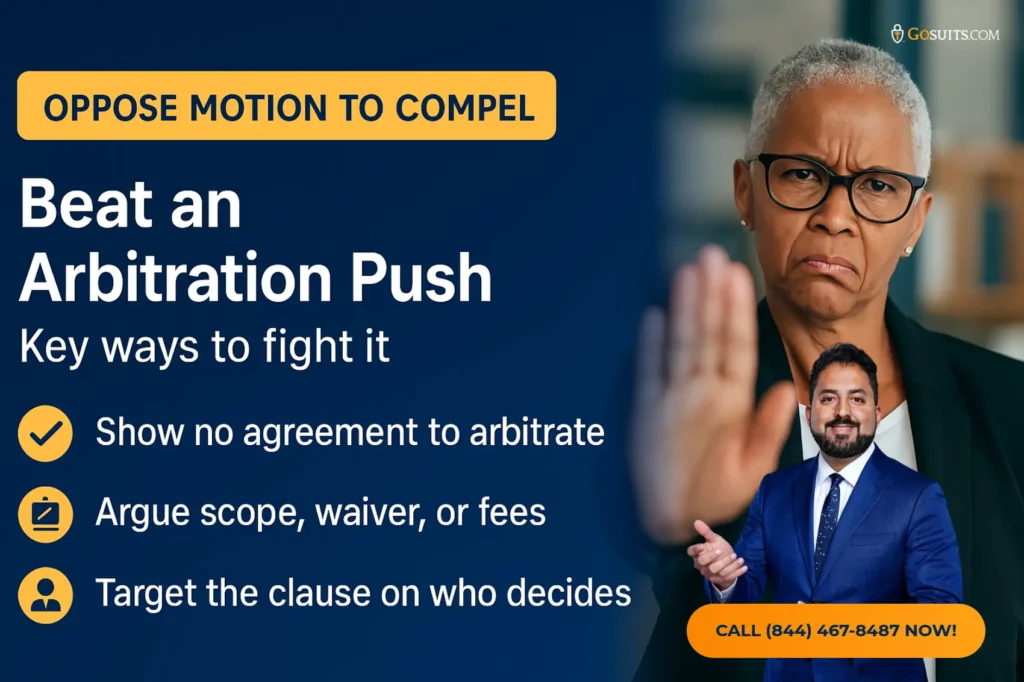
Practice areas include car collisions, rideshare and TNC incidents, trucking crashes, pedestrian and bicycle injuries, wrongful death, and other serious injury cases. If arbitration becomes a live issue, we examine consent, scope, delegation, unconscionability, waiver, and California’s SB 707 fee provisions. We also evaluate non-signatory doctrines for third-party claims. During a free consultation, we can walk through your facts, the applicable law, and next steps to protect your rights under California law.
Authoritative resources and citations
- Federal Arbitration Act, 9 U.S.C. § 2: Cornell Law LII
- Henry Schein, Inc. v. Archer and White Sales, Inc., 139 S. Ct. 524 (2019): CourtListener
- Rent-A-Center, West, Inc. v. Jackson, 561 U.S. 63 (2010): CourtListener
- AT&T Mobility LLC v. Concepcion, 563 U.S. 333 (2011): CourtListener
- Morgan v. Sundance, Inc., 596 U.S. 411 (2022): CourtListener
- Arthur Andersen LLP v. Carlisle, 556 U.S. 624 (2009): CourtListener
- Rosenthal v. Great Western Fin. Securities Corp., 14 Cal. 4th 394 (1996): Google Scholar
- Armendariz v. Foundation Health Psychcare, 24 Cal. 4th 83 (2000): Google Scholar
- OTO, L.L.C. v. Kho, 8 Cal. 5th 111 (2019): Google Scholar
- Goldman v. KPMG LLP, 173 Cal. App. 4th 209 (2009): Google Scholar
- Kramer v. Toyota Motor Corp., 705 F.3d 1122 (9th Cir. 2013): Google Scholar
- Mohamed v. Uber Techs., Inc., 848 F.3d 1201 (9th Cir. 2016): Google Scholar
- Meyer v. Uber Techs., Inc., 868 F.3d 66 (2d Cir. 2017): Google Scholar
- Oberstein v. Live Nation Entm’t, Inc., 60 F.4th 505 (9th Cir. 2023): Google Scholar
- California Arbitration Act, CCP §§ 1281.2 and 1281.4: § 1281.2; § 1281.4
- California SB 707, CCP §§ 1281.97–1281.99: § 1281.97; § 1281.98; § 1281.99
- Wrongful death and survival statutes, CCP §§ 377.60 and 377.30: § 377.60; § 377.30
- Transportation Network Company Insurance, Cal. Pub. Util. Code § 5433: PUC § 5433
- California Public Utilities Commission, Transportation Network Companies: CPUC TNCs
- California Office of Traffic Safety, Collision Data and Quick Stats: OTS Data
- McGill v. Citibank, N.A., 2 Cal. 5th 945 (2017): Google Scholar
